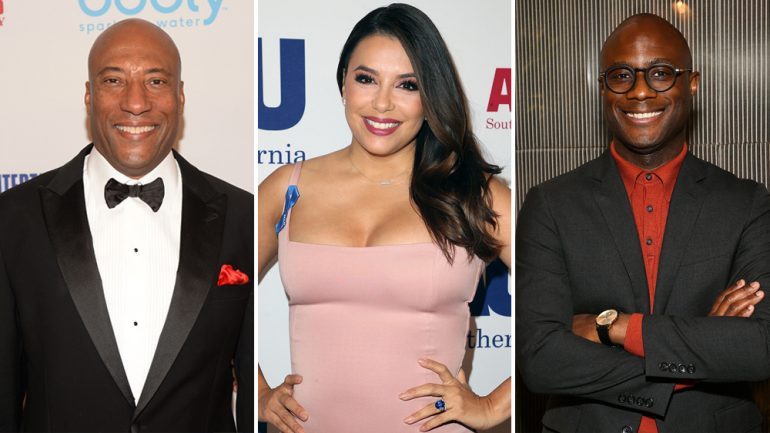Byron Allen, Eva Longoria and Barry Jenkins to Keynote Variety’s Annual Inclusion Summit
By Akiva Gottlieb
LOS ANGELES (Variety.com) – Storytellers, performers and industry leaders Barry Jenkins, Eva Longoria, Diego Luna, Byron Allen and George Schlatter will keynote Variety’s Inclusion Summit Nov. 15 at Four Seasons Beverly Hills. The daylong annual event brings together film, TV, and digital media industry innovators who are committed to inclusion, which goes beyond calls for diversity to consider how to most effectively galvanize a range of underrepresented voices and identities.
Jenkins, the Oscar-winning director of “Moonlight” and the upcoming James Baldwin adaptation “If Beale Street Could Talk,” says he feels a duty, as one of Hollywood’s most prominent black filmmakers, to participate in these industry-wide conversations.
“As someone who’s a very visible presence, it’s important to be out and present with these issues.”
He knows these discussions are a way of demonstrating accountability. “It’s important to illustrate how we’re activating these things in our own lives and careers,” he adds. “I just presided over a small writers’ room for Amazon’s ‘The Underground Railroad,’ and the room was built with a fidelity to the material in mind. The protagonist of that show is a young black woman, so to have made that show with no women or black people in the room would have been heinous. I think we can all picture a vision of the industry, in a time not so long ago, when that might have been the case.”
The afternoon of the Inclusion Summit will feature a conversation between the audacious and outspoken Entertainment Studios CEO Allen and legendary producer Schlatter.
A former comedian turned one of the world’s most prominent African-American media entrepreneurs (he recently purchased The Weather Channel) Allen has used all the tools at his disposal to make sure that the largest multichannel video programming distributors are committed to inclusivity. In fact, he has sued both Comcast and Charter over “economic inclusion” rights for people of color.
“Diversity is more than a responsibility,” says Allen. “It’s simply smart business.”
Schlatter, who helped break social barriers in entertainment through such shows as “Laugh-In” and “Real People,” also gave Allen his first break as a young comedian four decades ago.
Also taking part in a keynote conversation is actress Longoria, who has kept herself as busy with philanthropy as she is with production. Her Foundation is focused on empowering Latinas to “build better futures for themselves and their families through education and entrepreneurship.” She is also a member of the Latinas Who Lunch group, which helps build a base of mutual support among Latinas in the entertainment industry.
“We’ve all felt like the industry has pitted us against each other and made us feel like there’s only room for one, but that’s not true,” she told Variety earlier this year. “So if we unite and create opportunities for each other and pull each other up, there could be a lot more success for representation on TV.”
Another keynote conversation will spotlight Luna, the Mexican multi-hyphenate best known for roles in “Y Tu Mama Tambien” and “Rogue One: A Star Wars Story.” (He also has a part in ’ “If Beale Street Could Talk.”) Though Luna has had a busy Hollywood career, he recently decided to move back to Mexico City, to focus on such projects as running a successful documentary film festival, shooting episodes of Netflix’s “Narcos,” and his work as an anti-corruption activist.
The summit will also feature panelists Sarah Finn, the casting director of “Black Panther”; Susanna Fogel, director of “The Spy Who Dumped Me”; Rachel Morrison, the first woman nominated for a cinematography Oscar; Brie Bryant, head of unscripted for Lifetime; George Tillman Jr., director of “The Hate U Give”; Cheo Hodari Coker, executive producer/showrunner of “Marvel’s Luke Cage”; Lucinda Martinez, SVP, multicultural and international marketing, HBO, and others.
Topics of discussion will include hiring actors from underrepresented communities, corporate support for an inclusive society, the success of storytellers from traditionally underrepresented groups, effectively profiling different communities in reality TV, the “woke” marketing campaign, and the future of inclusive storytelling.

